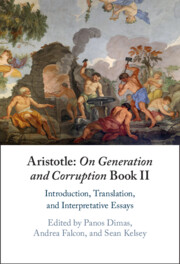 Aristotle: On Generation and Corruption Book II
Aristotle: On Generation and Corruption Book II Book contents
- Aristotle: On Generation and Corruption Book II
- Aristotle: On Generation and Corruption Book II
- Copyright page
- Contents
- Figures
- Tables
- Notes on Contributors
- Preface
- Abbreviations
- Part I Introduction and Interpretative Essays
- 1 On Generation and Corruption II
- 2 On Generation and Corruption II 1
- 3 On Generation and Corruption II 2
- 4 On Generation and Corruption II 3
- 5 On Generation and Corruption II 4
- 6 On Generation and Corruption II 5
- 7 On Generation and Corruption II 6
- 8 On Generation and Corruption II 7
- 9 On Generation and Corruption II 8
- 10 On Generation and Corruption II 9
- 11 On Generation and Corruption II 10
- 12 On Generation and Corruption II 11
- Part II Translation
- References
- Subject Index
- Index of Passages
7 - On Generation and Corruption II 6
from Part I - Introduction and Interpretative Essays
Published online by Cambridge University Press: 10 November 2022
- Aristotle: On Generation and Corruption Book II
- Aristotle: On Generation and Corruption Book II
- Copyright page
- Contents
- Figures
- Tables
- Notes on Contributors
- Preface
- Abbreviations
- Part I Introduction and Interpretative Essays
- 1 On Generation and Corruption II
- 2 On Generation and Corruption II 1
- 3 On Generation and Corruption II 2
- 4 On Generation and Corruption II 3
- 5 On Generation and Corruption II 4
- 6 On Generation and Corruption II 5
- 7 On Generation and Corruption II 6
- 8 On Generation and Corruption II 7
- 9 On Generation and Corruption II 8
- 10 On Generation and Corruption II 9
- 11 On Generation and Corruption II 10
- 12 On Generation and Corruption II 11
- Part II Translation
- References
- Subject Index
- Index of Passages
Summary
Aristotle’s longest and most comprehensive critical discussion of Empedocles’ natural philosophy occurs in GC II 6. He structures his criticism around four Empedoclean theses. (1) There are four kinds of elemental body and instances of these kinds do not change into one another. (2) Everything that comes to be by nature does so by chance. (3) Love and strife are the principles of natural bodily movement. (4) Soul is, or is constituted by, one or more of the four elemental bodies. I discuss Aristotle’s arguments against each of these theses in detail. Though Aristotle’s arguments are predominantly negative, we can view them as collectively constituting a sustained defense of the superiority of his preferred account. Aristotle’s natural philosophy centers on his novel understanding of nature as an internal principle and cause of movement and rest. I argue that the phenomena Empedocles is unable to explain adequately or endorse consistently are precisely the phenomena that Aristotle’s conception of nature is well-suited to explain.
- Type
- Chapter
- Information
- Aristotle: On Generation and Corruption Book IIIntroduction, Translation, and Interpretative Essays, pp. 126 - 150Publisher: Cambridge University PressPrint publication year: 2022
